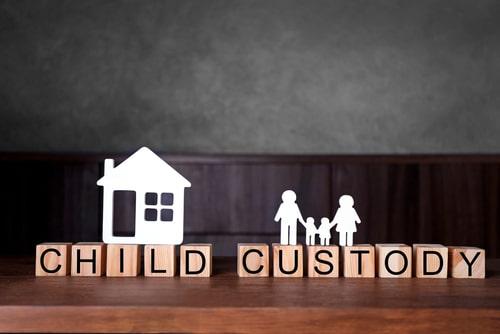Recent Blog Posts
5 Things Every Divorcing Parent Should Know
 If you have kids who are under the age of 18 and you are considering divorce, you almost certainly share concerns with many other people in the same situation. For example, parents often worry about how getting a divorce will affect their kids, how parenting time will be decided, and whether there is anything they can do to make things easier for their young children. If you are facing divorce, our Illinois divorce lawyers can help you get through the process, start to finish, with the confidence that comes from knowing you are doing your best for your kids. Here are five of the most important things every divorcing parent should know.
If you have kids who are under the age of 18 and you are considering divorce, you almost certainly share concerns with many other people in the same situation. For example, parents often worry about how getting a divorce will affect their kids, how parenting time will be decided, and whether there is anything they can do to make things easier for their young children. If you are facing divorce, our Illinois divorce lawyers can help you get through the process, start to finish, with the confidence that comes from knowing you are doing your best for your kids. Here are five of the most important things every divorcing parent should know.
The Court Focuses on the Child’s Best Interests
In Illinois, child custody is now referred to as the "allocation of parental responsibilities and parenting time." The court's most important concern is what is in the best interests of the child. This means that a judge will consider things like the child’s relationship with each parent, their comfort in their home and school, the ability of each parent to care for the child, and whether either parent has a history of violence or substance abuse.
What is the Difference Between Moving and Relocating With Children?
 Moving can be a hassle for anyone. For divorced parents seeking to relocate with children, moving can be an even bigger challenge. It is not as simple as packing up and heading for your new home. Depending on where you live now and where you plan on moving to, you may need to get consent from the other parent or the court - which could mean a hearing.
Moving can be a hassle for anyone. For divorced parents seeking to relocate with children, moving can be an even bigger challenge. It is not as simple as packing up and heading for your new home. Depending on where you live now and where you plan on moving to, you may need to get consent from the other parent or the court - which could mean a hearing.
If you are divorced and planning to relocate with your children, you should consult a qualified family law attorney first. Especially if a hearing is required, being represented by knowledgeable legal counsel can help the process move smoothly.
What Do “Moving” and “Relocating” Mean?
Although the two terms are often used interchangeably, they do not mean the same thing in the context of Illinois family law. Depending on which county the child’s current home is in, you are only “relocating” if you are moving more than 25 or 50 miles from that location. Otherwise, you are “moving.” If you have more parenting time and an existing agreement, you do not need permission from the court or the other parent to move with the child.
How Can I Establish Paternity in Illinois?
 It is not uncommon for parents to want to take the necessary steps to scientifically and legally establish the biological relationship they share with their children. Only when parentage (formerly called paternity) has been proven can a father assert his parental rights. There are a variety of ways to establish parentage in Illinois. All are equally effective, but some are easier than others. If paternity was not established at birth, you may want to seek the help of an attorney, who can guide you through the best way to establish legal parentage.
It is not uncommon for parents to want to take the necessary steps to scientifically and legally establish the biological relationship they share with their children. Only when parentage (formerly called paternity) has been proven can a father assert his parental rights. There are a variety of ways to establish parentage in Illinois. All are equally effective, but some are easier than others. If paternity was not established at birth, you may want to seek the help of an attorney, who can guide you through the best way to establish legal parentage.
What Are the Ways to Establish Paternity in Illinois?
Illinois courts typically believe that it is in a child’s best interest to have a relationship with both natural parents. Sometimes, however, it is not clear who the child’s legal father is. In that case, paternity must be established before parenting time can be allocated and a parenting plan can be made. In Illinois, you can establish paternity in these ways:
Factors That May Impact Relocation with Your Child
 Studies have shown that children greatly benefit from the ability to maintain healthy relationships with both of their parents, even when those parents are divorced or were never married. Because of this, Illinois law has requirements in place that parents must follow if one parent wishes to relocate a great distance away from their child’s current home. This is especially significant when parental responsibilities and custody are shared. A skillful child custody attorney can help parents to better understand relocation and its requirements.
Studies have shown that children greatly benefit from the ability to maintain healthy relationships with both of their parents, even when those parents are divorced or were never married. Because of this, Illinois law has requirements in place that parents must follow if one parent wishes to relocate a great distance away from their child’s current home. This is especially significant when parental responsibilities and custody are shared. A skillful child custody attorney can help parents to better understand relocation and its requirements.
What Constitutes Relocation?
In the state of Illinois, relocation is established based on the number of miles the new home will be from the child’s original home. However, this number is not consistent throughout the entire state and varies depending on the county the home is located in. For instance, a move will be considered a relocation if:
How Do Illinois Courts Decide Child Custody Cases?
 Whether you are divorced or you never married your child’s other parent, child custody issues can be contentious. Understandably, parents have strong opinions about what is best for their kids. When divorced or unmarried parents disagree about the allocation of parental responsibilities or parenting time, the court may intervene. If you are in the midst of a child custody dispute, it is important to understand the factors used by Illinois courts when ruling on these types of cases.
Whether you are divorced or you never married your child’s other parent, child custody issues can be contentious. Understandably, parents have strong opinions about what is best for their kids. When divorced or unmarried parents disagree about the allocation of parental responsibilities or parenting time, the court may intervene. If you are in the midst of a child custody dispute, it is important to understand the factors used by Illinois courts when ruling on these types of cases.
The Child’s Best Interests
The primary concern in a child custody dispute is reaching a resolution that promotes the child’s mental, physical, and emotional well-being. In other words, the court’s priority during a child custody case is the child’s best interests. Of course, what is in a child’s best interests is not always easy to ascertain. Illinois has adopted over a dozen individual factors that courts should consider when determining a child custody arrangement that is in the child’s best interest. These so-called “best interest factors” include:
How To Approach a Unique High-Asset Divorce in Illinois
 Divorce is often coupled with significant frustration, conflict, and expense. It may seem easier for wealthy couples to get divorced due to their financial stability. However, high-asset divorces often involve distinct obstacles, including how to appropriately separate the spouses’ assets. Each party involved in a high-asset divorce should be well aware of the divorce’s consequences and prepare themselves, their loved ones, and their assets accordingly.
Divorce is often coupled with significant frustration, conflict, and expense. It may seem easier for wealthy couples to get divorced due to their financial stability. However, high-asset divorces often involve distinct obstacles, including how to appropriately separate the spouses’ assets. Each party involved in a high-asset divorce should be well aware of the divorce’s consequences and prepare themselves, their loved ones, and their assets accordingly.
Factors to Consider in a High-Asset Divorce
Divorce poses unique challenges for wealthy couples due to the accumulation of assets throughout their marriage. The couple’s worth will likely dictate many factors of their divorce.
Firstly, it is possible that each spouse may want to pursue the use of financial experts throughout the divorce process. These experts will be able to determine how much the shared assets are worth. If there is a business involved, the experts will help to establish whether either or both of the parties have an ownership interest. Additionally, if either spouse is concerned that there may be hidden assets, a forensic accountant can analyze previous financial transactions.
What Are the Different Types of Spousal Maintenance?
 The divorce process entails an extensive list of divisions between the two spouses, including property division and the allocation of parental responsibilities. At the end of the day, the court’s goal is to ensure that the two separating parties complete the process as equals. While not legally required, awarding spousal maintenance, or alimony, can help to achieve this. A Kane County family law attorney can aid in pursuing spousal maintenance effectively. There are multiple types of spousal maintenance to consider. Before doing so, you should make sure that it is the right path for your situation. If there is a substantial income discrepancy between the separating parties, spousal maintenance is likely appropriate.
The divorce process entails an extensive list of divisions between the two spouses, including property division and the allocation of parental responsibilities. At the end of the day, the court’s goal is to ensure that the two separating parties complete the process as equals. While not legally required, awarding spousal maintenance, or alimony, can help to achieve this. A Kane County family law attorney can aid in pursuing spousal maintenance effectively. There are multiple types of spousal maintenance to consider. Before doing so, you should make sure that it is the right path for your situation. If there is a substantial income discrepancy between the separating parties, spousal maintenance is likely appropriate.
The Main Types of Spousal Maintenance in Illinois
In Illinois, spousal maintenance is not guaranteed. Unless you have signed a marital agreement promising maintenance, the court has the discrepancy to award spousal maintenance or spousal support on a case-by-case basis.
What Happens When Parents Disagree on Medical Decisions?
 For the past 18 months or so, the United States has been battling the COVID-19 pandemic. As more and more people get the COVID-19 vaccine, states have begun to lift restrictions and mask mandates, including Illinois, which lifted mask mandates at the end of May. Dealing with the pandemic has raised many legal issues, such as the rights of individuals when it comes to mask-wearing and vaccinations. As the FDA has granted one vaccine manufacturer emergency use authorization for children 12 and older, and a second is getting ready to request full licensure for children to receive their vaccine, another major legal issue may be looming: What happens when co-parents disagree on whether their child should receive the vaccine?
For the past 18 months or so, the United States has been battling the COVID-19 pandemic. As more and more people get the COVID-19 vaccine, states have begun to lift restrictions and mask mandates, including Illinois, which lifted mask mandates at the end of May. Dealing with the pandemic has raised many legal issues, such as the rights of individuals when it comes to mask-wearing and vaccinations. As the FDA has granted one vaccine manufacturer emergency use authorization for children 12 and older, and a second is getting ready to request full licensure for children to receive their vaccine, another major legal issue may be looming: What happens when co-parents disagree on whether their child should receive the vaccine?
Allocation of Parental Responsibilities
Several years ago, Illinois lawmakers did a complete overhaul of the state’s family law statutes. Included in those changes was the elimination of terms like child custody and visitation. Instead, family court judges issue orders regarding the allocation of parental responsibilities and parenting time.
Legal Options When a Parent Refuses to Pay Child Support
 In Illinois, just like every state in the country, there are laws that say that each parent has a duty of support owed to their child. This duty extends to providing for the "reasonable and necessary physical, mental and emotional health needs of the child." The Illinois statute defines a child as one who is under 18 years of age and any child 19 years or younger who is still attending high school.
In Illinois, just like every state in the country, there are laws that say that each parent has a duty of support owed to their child. This duty extends to providing for the "reasonable and necessary physical, mental and emotional health needs of the child." The Illinois statute defines a child as one who is under 18 years of age and any child 19 years or younger who is still attending high school.
When a marriage, civil union, or relationship ends, or paternity has been established, the court has the authority to order one parent to pay the other parent child support. Which parent pays child support depends on how the allocation of parental responsibilities and parenting time is established (formerly referred to as child custody). Unfortunately, not all parents adhere to these child support orders and either fail to pay according to the ordered payment schedule or refuse to pay any support at all.
In these circumstances, what are the legal options for the parent who is not receiving child support payments?
Can I Appeal the Court’s Decision Regarding My Illinois Divorce?
 When a divorcing couple cannot reach an agreement about property distribution, child custody, spousal maintenance, or other divorce terms, the case may go to trial. During a divorce trial, each side presents arguments and evidence that support their claims. The court considers each party’s arguments, examines the evidence, and then hands down a decision about the unresolved issues. If you have received a ruling from an Illinois court regarding your divorce that you disagree with, you may be able to appeal the court’s decision.
When a divorcing couple cannot reach an agreement about property distribution, child custody, spousal maintenance, or other divorce terms, the case may go to trial. During a divorce trial, each side presents arguments and evidence that support their claims. The court considers each party’s arguments, examines the evidence, and then hands down a decision about the unresolved issues. If you have received a ruling from an Illinois court regarding your divorce that you disagree with, you may be able to appeal the court’s decision.
What Are the Grounds for Appealing a Divorce in Illinois?
You cannot successfully appeal a court’s decision simply because you do not agree with the court’s finding. If you believe that the judge was wrong, you will need to show grounds or reasons that justify an appeal. A successful appeal is possible when a court’s ruling is based on mistaken or false information. For example, if the information used by the judge when making the decision was incomplete or inaccurate, you may be able to appeal the decision. Procedural mistakes or an incorrect application of Illinois law may also justify an appeal.

 630-581-2877
630-581-2877




